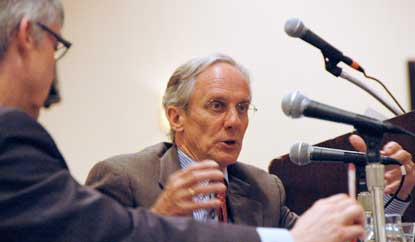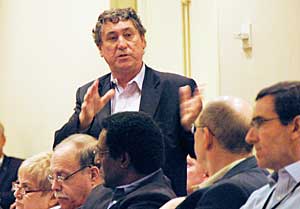
At PBS meeting in Baltimore, Bettag reports what he found in his round of interviews with public TV news producers.
In PBS news cooperation talks, Bettag says, ‘nobody pulled back’
Tom Bettag, the former ABC Nightline and CBS News producer, says he’s “on a very fast timeline” to report to PBS by June 15 [2009] about what public TV’s separate and unequal newsgathering units could and should do by collaborating online.
With Bettag’s help, PBS’s News and Public Affairs Initiative aims to make plans by fall, launching some projects immediately and finding funds for others, said John Boland, PBS chief content officer. He hired Bettag and project director Dan Morris with funds from the Pew Charitable Trusts.
After Bettag made the rounds of news execs in the NewsHour, Frontline and other public TV news units, and some in public radio, he assembled many of them May 12 during the PBS Showcase conference in Baltimore to double-check what they had told him.
He asked, “Does anybody want to step away from the table?” Bettag told Current. “The good news was that nobody pulled back at all.”
Boland said he asked Bettag and Morris to recommend how pubcasting could make its news output “greater than the sum” of what its separate units produce. “The goal,” Boland told Current, “is that our news and public affairs content would be more accessible to the audience, more coordinated and more connected.
What if someone wants to see everything about the Bernard Madoff scandal? asked program consultant Robyn DeShields during a public Showcase session May 13.
Boland replied: By presenting news in the separate online “silos” of separate programs and organizations, “we make it very difficult” to satisfy such viewers.
Beyond producing video reports, there is “profoundly important work” to do in connecting the news reports to supplementary material, added David Fanning, e.p. of Frontline.
“If there’s a single mover in this, it’s Fanning,” Bettag told Current, and the fact that Fanning runs Frontline strengthens his case. Fanning “has no personal reason why he should join in something like this, because Frontline is a good stand-alone and is doing just fine.” Bettag adds: “If the NewsHour and Frontline are willing to say we need to collaborate, then you’re pretty close to game, set, match.”

Fanning (above) pushed for talks about online collaboration among pubcasting news units, including radio's.
The elephant that’s not quite in the room is NPR. Bettag said in an interview that NPR President Vivian Schiller has seconded Fanning’s views. At the moment, however, NPR is now immersed too deeply in internal transitions to join in talks with public TV.
The big opportunity is not just a deal to share news copy online, Bettag said. But it’s not clear how far talks will go into coordinated newsgathering. And it’s “way too early” to talk about structural questions. “If I can get the people to the table,” Bettag said, “they can work that out on their own.”
Online collaboration: TV, radio have sitdowns
PBS will go public Wednesday with discussion of its News & Public Affairs Initiative — an ongoing study that’s weighing options for cooperation and online collaboration among its news units and with those of public radio.
Journalists from public TV and radio have had their “first sit-downs about what might be possible in the syncing of radio and television,” says Tom Thomas, co-c.e.o. of the Station Resource Group.
Appearing with PBS officials in a PBS Showcase session, 11 a.m. May 13, will be project facilitator Tom Bettag, former ABC Nightline e.p. The initiative is funded by a Pew Charitable Trusts grant to the public TV network.
Reps from the NewsHour, Frontline and other PBS public-affairs units and from NPR and other public radio news units have been invited to meet for discussions the day before.
PBS asked Bettag to consider how public TV can reinvent its public affairs offerings, and Bettag has been quizzing leaders of news units, according to David Fanning, e.p. of Frontline.
PBS declined to discuss the initiative with Current last week.
“We should be prepared to think very big and very much out of the box,” Fanning said in an interview. “If we are able to set aside our parochial interests, we could create something tremendously powerful, and it would be the beginning of the remaking of public media,” he said.
At a PBS producers meeting, Fanning recalls: “I put my hand up and said, ‘Before we take off the table the idea of centralization, we should really challenge ourselves both in television and in radio to think about whether we ought to create a unified news organization. Past attempts to connect them have failed, but maybe the way we should do it is to create a third space.’ ”
The subject has new urgency, according to Fanning, Thomas and others, because the foundation world and Congress are now paying attention to the plight of journalism as newspapers’ capabilities dwindle alarmingly. The media reform group Free Press will hold a summitThursday in Washington to put forth its agenda, including support for public broadcasting.
A bipartisan panel, the Knight Commission on the Information Needs of Communities in a Democracy, is finalizing its recommendations this month, and isn’t shy about comparing itself to the Carnegie Commission of four decades ago.
At the same time, doing things jointly is very much in. With CPB’s blessing, the word “collaboration” has taken a prime place in pubcasting’s mental tag cloud and in grant proposals.
Turning the buzzword into reality will take some work, says Lee Banville, head of the Online NewsHour.
“The proof will be whether we all will be willing to change the way we do our jobs,” Banville says, and that will turn on whether the audience values the products of the collaboration.
The NewsHour doesn’t see itself as a standalone program any more, Banville says. It’s working with NPR’s Morning Edition and Judy Woodruff on next month’s shared project about youth and the economy.
NPR is by far the most self-sufficient of the news units, and pubradio stations are wary in their bones of distracting entanglements with pubTV. But NPR’s point man on the shape of the future, NPR Digital Media chief Kinsey Wilson, may be disposed to consider alliances because of the way web users look for news.
Wilson is a strong proponent of “content verticals,” according to Thomas. Online news-seekers like to stack up reports on a “vertical” subject from multiple sources, and perhaps from multiple public-media sources.
A number of public radio leaders, including a station association, Western States Public Radio, also have spoken up for joint online presentation of pubradio news, and some add in pubTV content. Draft recommendations of the Grow the Audience report, facilitated by Thomas, advise public radio: “Create an integrated online news presence for diverse public media sources.”
For a model, Thomas looks to the online video site Hulu, which appears to be satisfying its founding partners Fox and NBC, despite their on-air competition.
But all news units in public media are wary of alliances that could hurt their brands, Thomas notes. He suggests starting cooperation around the behind-the-scenes online infrastructure that doesn’t intrude on news units’ brand identity, says Thomas. Sharing back-end machinery was recommended by pubradio’s Digital Distribution Consortium two years ago, Thomas says, but support for that proposal was undermined by a provision that NPR handle the revenue generation.
Ad hoc newsgathering partnerships could follow, Thomas says, and perhaps even the creation of a new “ongoing news enterprise” in a third space, as proposed by Fanning.
Photos: Steve Behrens, Current
Web page posted June 5, 2009
Copyright 2009 by Current LLC